Just a reminder that I will be presenting an online class called “Plot Considered as a Four-Dimensional Array of Brightly Colored Beads” via the Speculative Literature Foundation on October 15! Hope to see you there! https://speculativeliterature.org/plot-considered-registration/
Author Archive
LARP Report: A Meeting of Monarchs
As I write this I’m on my way back to the 21st Century USA from the LARP A Meeting of Monarchs. I had a blast.
In this Live Action Role Play event, inspired by the historical “Field of the Cloth of Gold” (1520) at which King Henry VIII of England and King François I of France met to sign the Treaty of London, about 50 players from all over Europe and the USA were assigned roles as specific historical personages. Each of us was given detailed background information on our characters and their goals, and some key events that occurred during play were preordained, but the player interactions and dialogue were entirely improvised in real time.
There were a lot of different plots in motion, some of them related to the treaty and others not, some historically accurate and others modified from our timeline. For example, the excommunication of Martin Luther and the death of Pope Leo X both occurred during the game, though in real life they didn’t happen until later. There was international and national politics; marriages, divorces, and affairs; personal alliances and vendettas; and maneuvers for power within the two courts and the Church hierarchy.
This was what is called a “Nordic” LARP, unlike the boffer-combat style of LARP most freqently encountered in the USA. The game didn’t have a combat system per se, though there were a few duels and fist fights (and, notably, a climactic wrestling match between the two kings). Instead, the major game mechanic was the exchange of status tokens. Each player started each day with a number of tokens (more for higher-status players) and during the game players and NPCs could hand over tokens to other players in acknowledgement of a notable accomplishment or as a bribe to take an action. Tokens could not be lost or stolen, only given away, and receiving a token from a member of the other court counted double. At the end of each day the tokens were counted up and either the French or English court would be announced as the winner. We were strongly encouraged to keep the tokens circulating and not hoard them to ourselves. The two kings each also had gold tokens, representing royal favor, and black tokens, representing shame, to hand out.
The game was held at Château du Boisrenault, an 18th-century castle in the French countryside, and run by French LARP organizer Charmed Plume Productions, but was conducted almost entirely in English. The variety of player accents added to the verisimilitude of the setting, as did the superb costumes worn (and in many cases made) by the players and the presence of several players’ dogs. The organizers also provided props, decor, live music, outdoor pavilions, and delicious meals to add to the immersive experience. Truly it did feel as though we spent a weekend in the Renaissance. (Sadly, as we were all very busy and phones were to be kept out of sight, I took very few photos. There was a professional photographer, though, and his photos will be made available in a few months. Until then, you can see some photos from previous runs of the game.)
I played the poet Thomas Wyatt, and my partner Alisa played the scheming Cardinal Thomas Wolsey. (Everyone was a Thomas in those days, it seems, unless they were a Mary.) Wyatt was only 17 at the time, and in real life didn’t even come to court until later. He was a young man with great ambition and few resources, and I determined to play him as brash and daring, unafraid to take risks. It didn’t turn out quite as I expected.
One of the key things about Wyatt, in history as well as in the game, is that he grew up with Anne Boleyn. They were practically siblings together in the Boleyn household, and by all accounts were extremely close. Was Wyatt in love with Anne? Well, historians disagree, but he did write a poem called “Whoso List to Hunt,” including the famous lines
And graven with diamonds in letters plain
There is written, her fair neck round about:
Noli me tangere, for Caesar’s I am,
And wild for to hold, though I seem tame.
(In other words: back off, man, she belongs to the king.) In any case, in the game materials it was made quite clear that Wyatt was utterly smitten with Anne. So I determined before the game that I was going to propose to her, despite the difference in our stations and her father’s ambitions for her. I brought a ring and everything. I didn’t know what her answer would be — that would depend both on how the character was written and what the player wanted to do with her — but I thought it would make for a dramatic scene either way.
On the first day of play I approached Anne player-to-player, saying “hey, I want to set up a big public proposal scene.” (There was a lot of pre-game material about consent and safety, complete with a set of safewords, to reduce the chance of physical or emotional harm to anyone. So I wanted to get the player’s buy-in beforehand, even if the proposal would be a surprise to the character.) She was perfectly kind to me and made it clear that her answer was going to be no, but if I wanted a big humiliation scene she would be willing to help make it happen? Well no, actually, I didn’t, but we did decide on a small personal proposal scene at lunch that day.
By lunchtime it was abundantly clear that Anne and Henry were already very much A Couple, much to the dismay of Queen Catherine and many other members of the court. (In actual history this didn’t happen until some years later.) And so, when lunch time came and Anne walked past the open seat next to me to take her place next to the King, the ring stayed in my pocket. (Later she approached me player-to-player to make sure I was okay. I told her that I was, though the character was devastated.) So my character’s main goal for the game foundered on the rocks before even leaving the harbor. But I had plenty of secondary goals to pursue.
One of these was to engage in a debate. During the historical Meeting of Monarchs the two courts held a series of debates on the issues of the day, and before the game I did a bunch of research on Wyatt and Humanism and proposed several Humanistic propositions as topics for debate. I wound up paired with Charles III, Duke de Bourbon, a very heavy hitter in the French court and a strong traditionalist. He would be arguing the proposition that “Only Law Brings Peace,” and I had to argue the contrary.
I prepared a five-minute speech, based on Wyatt’s actual writings, in which I quoted Erasmus, Petrarch, and Plutarch to support my position that the law, by itself, is insufficient. “The law may influence good men,” I wrote (or perhaps copied and pasted from Wikipedia), “but is without effect upon the bad. But a society of learned men, imbued with the virtues of the ancients and the ability to argue persuasively in favor of these virtues, will inevitably produce peace, tranquility, and harmony.” I thought it was a very pretty speech, but given the pre-game discussion about the debate topics — some of the more conservative characters were throwing around words like “heresy” and “felony” and “Inquisition” — I figured I had no chance to sway the crowd.
But they loved it. After our prepared speeches, our improvised rebuttals, and a spirited ad-hoc discussion with the audience, I was absolutely showered with status tokens. The Duke de Bourbon offered his respects. Thomas More took me under his wing. And the King of France came up to me to offer me an invitation to his court! I wound up with the second-highest individual token count of the day.
After that I was much in demand as a wordsmith and wit. Many people requested my assistance in crafting love poems, or romantic advice, and I did my best to help. I composed a poem about the Pleiades for a Duke, who gifted me with a cottage and an orchard. And I was often the center of attention during mealtime conversations. I truly enjoyed the several philosophical conversations I had with Thomas More and Leonardo da Vinci (who, sadly, in actual history had died the year before).
In a lot of ways Wyatt was the perfect character for me. All I had to do was give free rein to my wit and ego and use my real-world writing skills. It’s kind of astonishing how good a fit he was, actually, because I was offered the part pretty much at random. My partner Alisa and I had learned of the event after the registration deadline, but we had joined the waiting list, and when two players dropped out just a few weeks before the event we were offered their parts. “Here’s Thomas Wyatt and Thomas Wolsey, which of you wants to be which?” I wound up with Wyatt mostly because we both felt that Wolsey would be a better physical fit for Alisa.
In the morning of the last full day of the game all the plots shifted into high gear, as Henry announced that he wanted a divorce and furthermore that he wanted to split off England from the Catholic Church. (Again, this didn’t happen in the real world until some years later.) I felt that Wyatt, especially given the close relationship he’d developed with Thomas More, would choose his Catholic faith over fealty to his king, and so I wrote and performed a passionate poem in praise of unity and peace, using as allegory the Bible story of Solomon and the baby. (Seriously. I wrote a poem. Seven stanzas, with an a-b-b-a rhyme scheme.) Again the tokens showered down, and furthermore some people told me their characters’ minds were changed by it — including Charles III de Bourbon! I was truly humbled by their reaction.
Lots of other things were happening in my world at the same time. I was a member of a literary salon, and I wrote a satirical limerick to help expose the identity of an anonymous critic who’d been sending people nasty notes. (He got a black token from King François for that.) I was also a member of a secret occult/alchemical group who were investigating a mysterious death. The scene in which we took the culprit off into the bushes at night and exacted appropriate retribution was an emotional highlight of the event for me, and for others as well.
The situation may have been made up and the points didn’t really matter, but the emotions were real. I am not a person who cries a lot, usually, but I cried real tears at least five or six times during the game. And the fear I felt whenever I found myself in Henry’s presence was just as real as the similar emotions I experienced when dealing with C-Suite officers in my years in high tech.
So even though I didn’t get the girl and I wasn’t really a player in any of the big important plots (princes and princesses were betrothed, nobles gained and lost titles, territories were traded, and treaties were signed, but I wasn’t involved in any of those except peripherally) I still had a whale of a time. I felt that I participated fully and made a difference to other players and other characters.
At the end we all said our goodbyes and returned to our original century and countries, but there was a lot of “oh, will I see you at Fairwood Manor?” and other indications that the European LARP community is a lot like science fiction fandom. I’ll be returning to Europe for more LARPs in 2024.
Plot Considered as a Four-Dimensional Array of Brightly Colored Beads – October 15
Hey folks! I will be presenting an online class called “Plot Considered as a Four-Dimensional Array of Brightly Colored Beads” on October 15! I just finished creating the slides and I can promise you it will be entertaining! https://speculativeliterature.org/plot-considered-registration/
Here are some sample slides to whet your appetite:

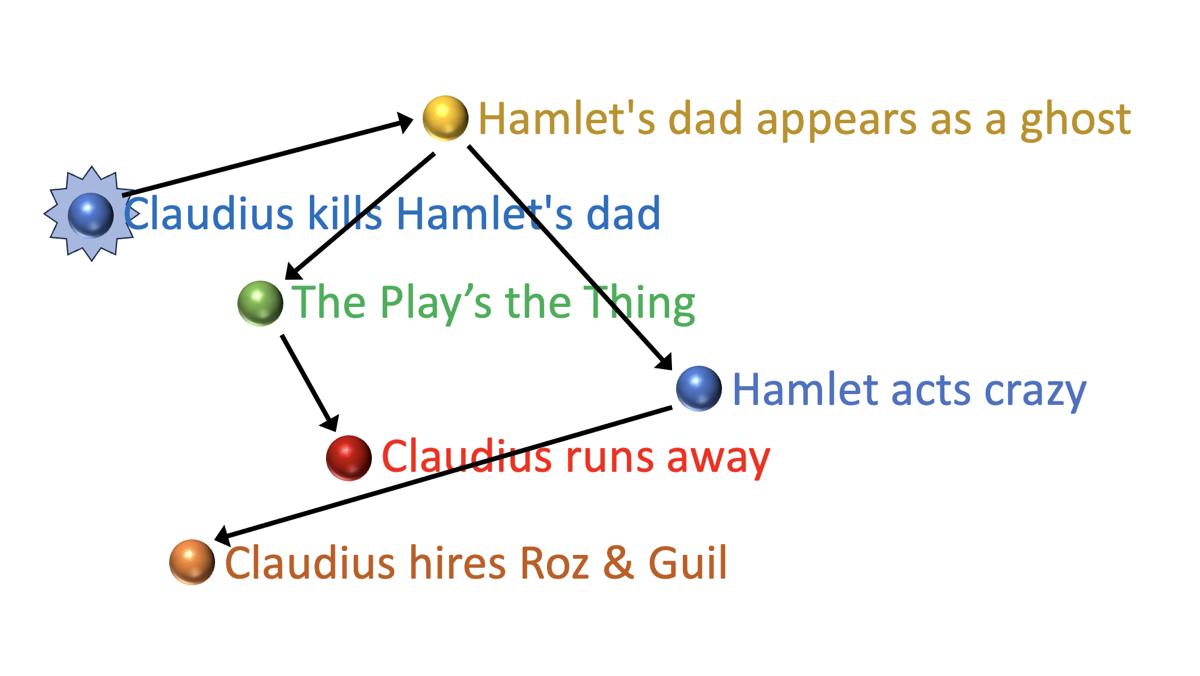
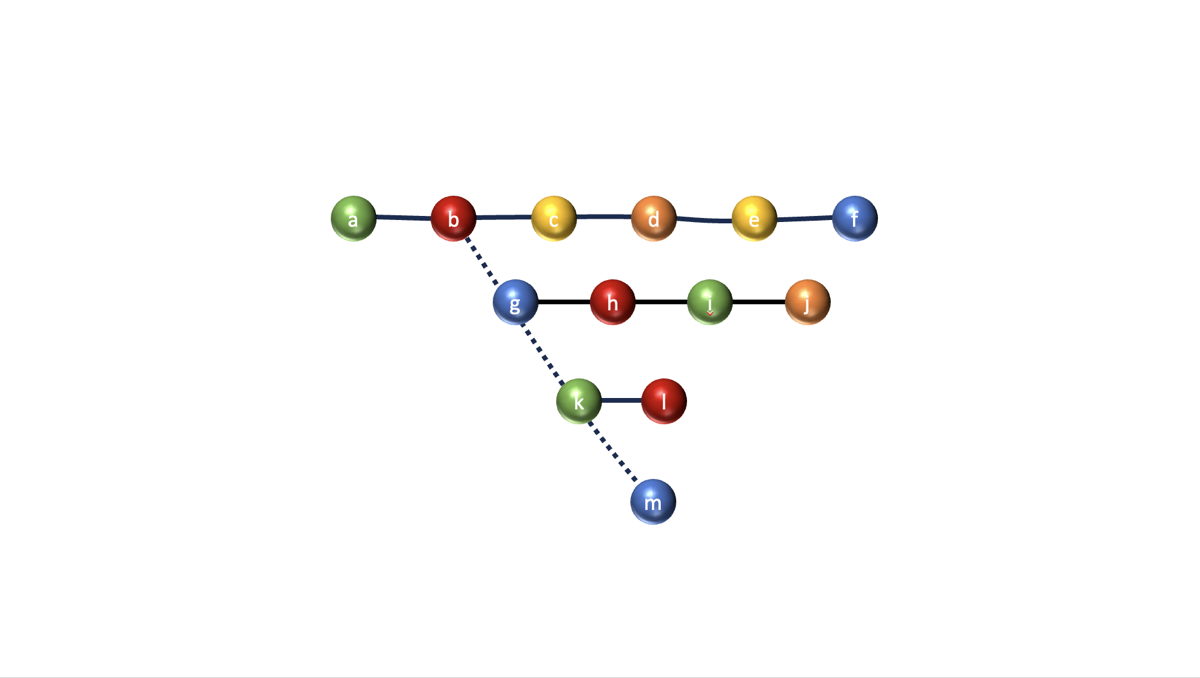
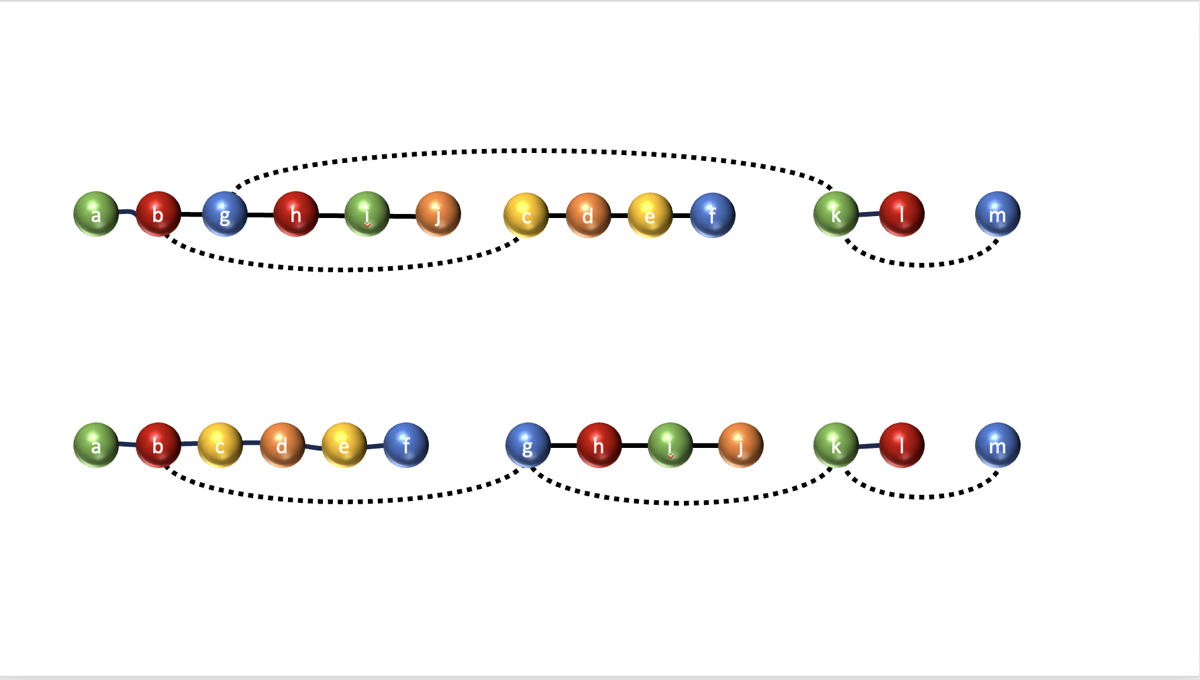
First Kuiper Belt Job blurb!
Just got my first blurb on The Kuiper Belt Job, from an unexpected source: editor Debra Nichols! And it’s a doozy!
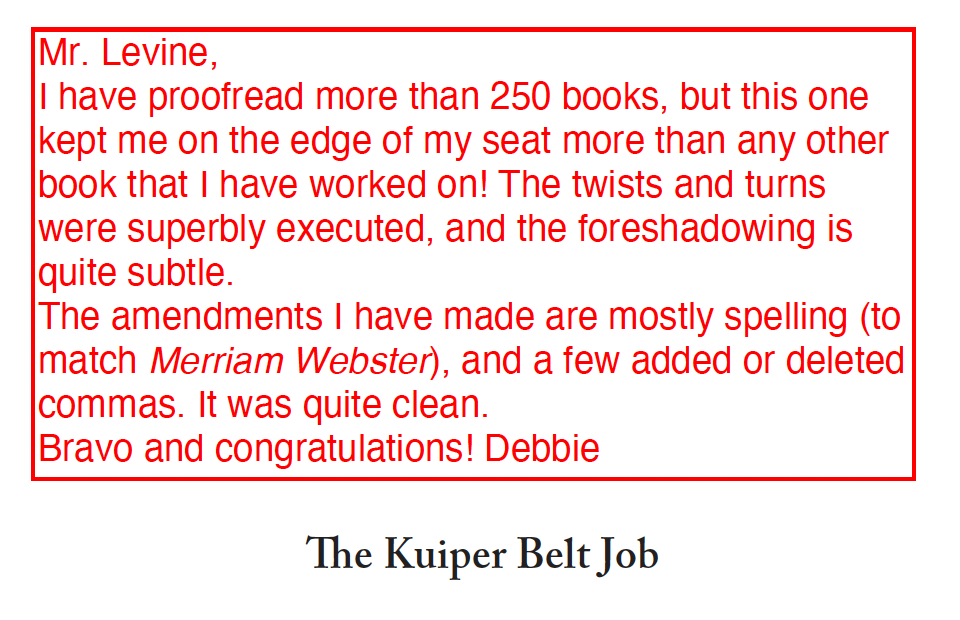
Kuiper Belt Job book trailer!
I now have a promotional video for my forthcoming novel The Kuiper Belt Job!
It’s available on all the platforms! Please share it with your friends!
- YouTube: https://youtu.be/Y6VFJFZySWo
- Instagram: https://www.instagram.com/reel/CxRB-SZyM5U
- Facebook: https://www.facebook.com/reel/696185079027069
- TikTok: https://www.tiktok.com/@daviddlevine/video/7279516485503044907
- Tumblr: https://www.tumblr.com/david-d-levine/728741505192312832/the-kuiper-belt-job-book-trailer-once-upon-a-time
The video was made for me by the very talented Edward Martin III of Hellbender Media.
Cannibal Club trading cards!
Hey kids! CANNIBAL CLUB TRADING CARDS! These cards showing the characters of my new novel The Kuiper Belt Job will be available exclusively at my in-person appearances in October-December!
Art is by Yuki Saeki, design and layout by Amy Young-Leith.
Integrating Character, Plot, and Worldbuilding
If you are attending Rose City Comic Con in Portland, Sep 22-24, 2023, I will be presenting a class on “Integrating Character, Plot, and Worldbuilding” on Saturday evening.
Kuiper Belt Job ARCs now available!
I now have eARCs of my novel The Kuiper Belt Job, pub date 11/7/23. If you are a reviewer, book blogger, booktuber, or anything like that, please contact me and I’ll send you a copy.
New online class 10/15! “Plot Considered as a Four-Dimensional Array of Brightly Colored Beads”
So… I had this weird idea.
A few years ago I was thinking about plot, as I often do, and realized that the “plot” of a story is not necessarily the same as the “story,” which is also different from the “narrative.” It’s kind of counterintuitive and strange, but I think it’s helped me figure out how to get my hands around complicated stories and put them onto the page. I call it “Plot Considered as a Four-Dimensional Array of Brightly Colored Beads,” and now I’ve been invited by the Speculative Literature Foundation to present an online class about it.
Here’s the class description: “This is a new theory of mine in which I consider a story as a collection of related events, each of which occurs at a point in space and time. If you picture these events as beads, you can create a plot by stringing them together in chronological order. There may be more than one plot string, but plot is always chronological, because the events of the plot are connected by cause and effect (unless you are writing a time travel story). Once you have a plot, you can snip those strings into segments and lay them out, not necessarily in chronological order, in a single line which is the narrative of the story. Thinking of story in this way can lead to some interesting insights into the relationship between the events of the story, the cause and effect relationships between them, and the order in which they appear on the page.”
If you are interested in this class, it will be presented online on Sunday October 15, 2023 from 5pm to 7:30pm CDT. You can sign up here: https://speculativeliterature.org/plot-considered-registration/
It’s an Enigma!
You may recall that I posted a few weeks ago about an auction that the WGA was holding to benefit the striking writers. Well, there was an item that I totally fell in love with and I just had to buy it. And now it’s here. It’s an Enigma Machine!!
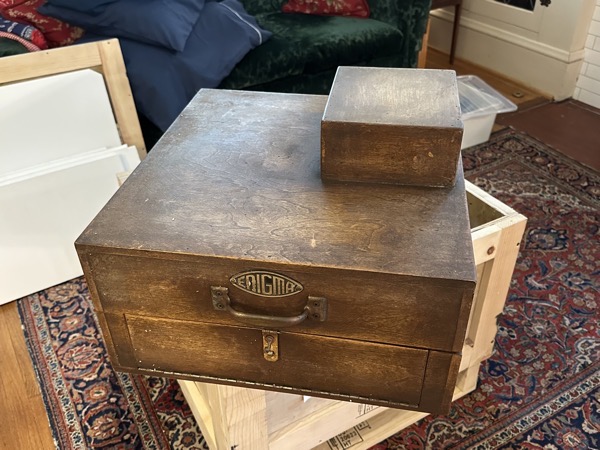

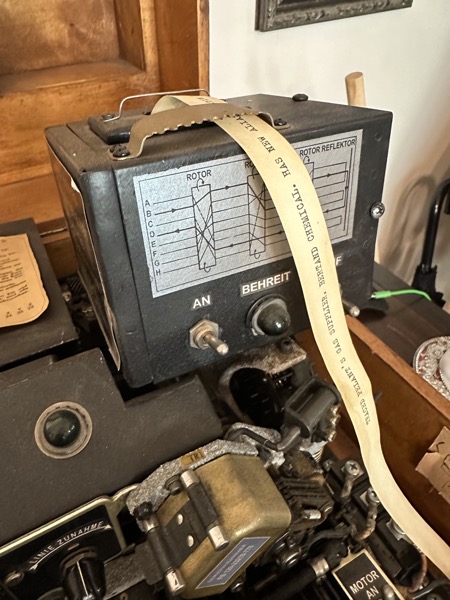
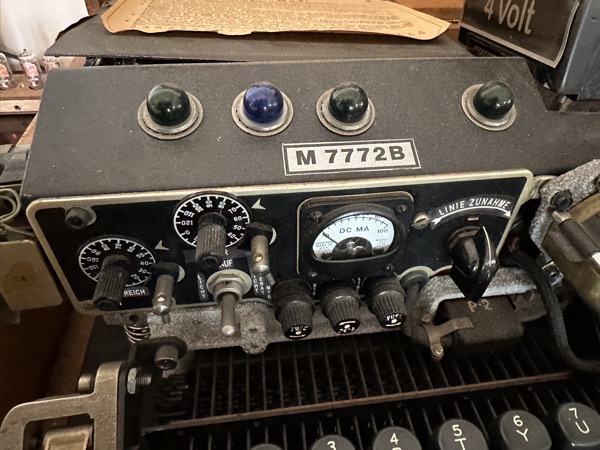
Not a real Enigma Machine, of course. It is actually a prop from the TV show Bones, episode “The Corpse on the Canopy.” But it is gorgeous! Also very heavy.
It was made by propmaster Ian Scheibel http://www.ianscheibel.com/#/enigma-code-machine/.
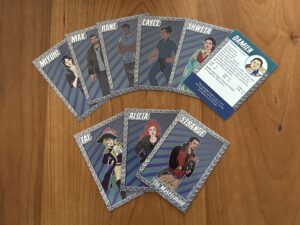
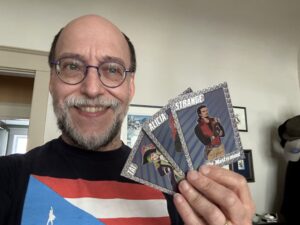
Recent Comments